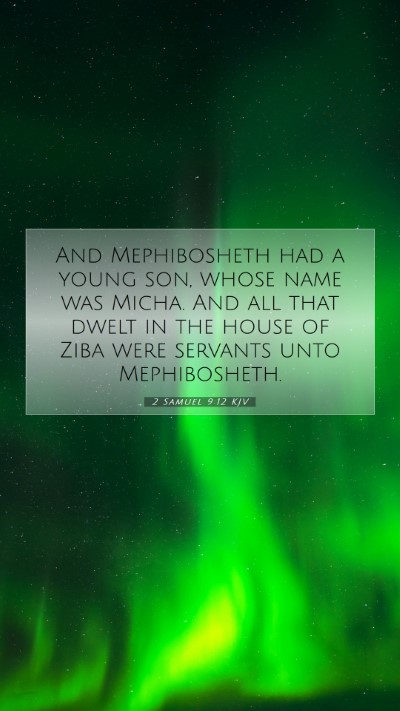Old Testament
Genesis Exodus Leviticus Numbers Deuteronomy Joshua Judges Ruth 1 Samuel 2 Samuel 1 Kings 2 Kings 1 Chronicles 2 Chronicles Ezra Nehemiah Esther Job Psalms Proverbs Ecclesiastes Song of Solomon Isaiah Jeremiah Lamentations Ezekiel Daniel Hosea Joel Amos Obadiah Jonah Micah Nahum Habakkuk Zephaniah Haggai Zechariah Malachi2 Samuel 9:12 Meaning
What is the meaning of 2 Samuel 9:12?
And Mephibosheth had a young son, whose name was Micha. And all that dwelt in the house of Ziba were servants unto Mephibosheth.
2 Samuel 9:12 Bible Verse Meaning
Understanding 2 Samuel 9:12
2 Samuel 9:12 states: "And Mephibosheth had a young son, whose name was Micha. And all that dwelt in the house of Ziba were servants unto Mephibosheth."
Overview of the Verse
This verse highlights the lineage and status of Mephibosheth, the son of Jonathan and grandson of King Saul. It also indicates his position following King David's ascension to the throne.
Bible Verse Meanings and Interpretations
The significance of this verse extends beyond a mere historical account; it reflects themes of grace, restoration, and the fulfillment of promises.
Insights from Public Domain Commentaries
-
Matthew Henry
Henry interprets this verse as indicative of God's mercy and kindness, observing that Mephibosheth's heritage as the son of Jonathan places him in a position of vulnerability after the death of Saul. The mention of Micha, his son, suggests hope for continuity and legacy within a difficult family history.
-
Albert Barnes
Barnes indicates that Mephibosheth’s situation illustrates the theme of grace in the face of adversity. Despite the potential for conflict due to his lineage, David's kindness toward Mephibosheth ensures that he maintains a place within the royal household, further emphasizing the covenant made between David and Jonathan.
-
Adam Clarke
Clarke emphasizes the importance of Micha's mention in establishing Mephibosheth’s family lineage. This not only validates the care that David showed but also ensures Mephibosheth's descendants would be recognized and cared for as part of the royal line.
Key Themes in 2 Samuel 9:12
- Grace and Restoration: Mephibosheth's life changes significantly after his encounter with David, highlighting how grace can elevate one's circumstances regardless of lineage.
- Covenant Fulfillment: David's actions reflect the commitment he made to Jonathan, demonstrating how sacred promises can shape royal and familial relationships.
- Legacy and Family: The introduction of Micha signifies the ongoing legacy of Mephibosheth, reinforcing the idea that one's identity and future can be secure through familial bonds.
Application of 2 Samuel 9:12 in Daily Life
This verse invites readers to consider the importance of grace and forgiveness in their own lives, reminding us that our backgrounds do not define our potential or relationship with others. It challenges us to honor our commitments to family and friends and to extend kindness where there may be a history of hurt or animosity.
Bible Cross References
- 1 Samuel 20:14-15: Discusses the covenant between David and Jonathan.
- 2 Samuel 9:1: David's inquiry about any remaining descendants of Saul.
- 2 Samuel 9:5: David’s act of bringing Mephibosheth to his palace.
- 2 Samuel 4:4: Background on Mephibosheth, how he became disabled.
- Psalm 23:6: Relates to the themes of grace and faithfulness of God.
Conclusion
In conclusion, 2 Samuel 9:12 is a profound reminder of how grace can transform lives. Through the analysis and theological insights drawn from this text, we gain a richer understanding of its application in our lives and relationships today.


